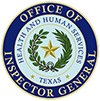Texas Exclusions Database helps providers protect their patients
The Texas Exclusions Database simplifies applicant screening for Medicaid providers, offering the ability to better protect their patients with real-time verification of potential employees before they are hired.
Texas Health and Human Services (HHS) Office of Inspector General (OIG) protects the health and welfare of people receiving Medicaid by preventing certain people or businesses from participating as service providers. Medicaid providers are responsible for making sure they don’t employ individuals listed on the state or federal OIG exclusion lists. The requirement applies to not only the health care practitioners, such as nurses and other direct care providers, but also to employees such as front office staff.
What leads to exclusion?
Federal and state OIGs may prohibit people or businesses from participating as Medicaid providers for several reasons, including Medicaid fraud convictions, patient abuse, Medicare program exclusion or licensing issues with any licensing boards for health care practitioners, such as the Texas State Board of Dental Examiners, Texas Medical Board or Texas State Board of Pharmacy. In fiscal year 2021, the Texas OIG excluded 201 providers of all types from HHS program participation. Typical actions across provider types that lead to exclusion include:
- Forging documentation and colluding with clients to bill and share payments for services not rendered
- Billing for false claims
- Illegal Medicaid client solicitation
Physician exclusions typically arise at the OIG due to a criminal conviction through the Medicaid Fraud Control Unit at the Office of Attorney General or a notice from the Centers for Medicare & Medicaid Services.
The consequences of exclusion
When a person or entity is excluded from Medicaid or other HHS programs, they may not be reimbursed for providing goods or services or request or receive payment for services performed under Medicaid or any other HHS program. Excluded providers may not assess care or prescribe services to clients who use HHS programs. A provider employing an excluded person may not bill Medicaid or any other HHS program for the excluded employee’s services. Submitting claims for payment for an excluded employee’s services could result in recoupment of any compensation paid to the ineligible worker, program termination, program exclusion or monetary penalties imposed.
An employer’s responsibility
The OIG settled a case in December against a medical provider who employed an excluded individual. The provider had checked the list at the time of hire, but the individual was added to the exclusion list two months later. The provider worked collaboratively with OIG Litigation to resolve this issue, and the OIG agreed to a settlement of $1,095.
Many exclusion cases come to the OIG through a provider’s self-reports, but the OIG also initiates exclusion reviews. An initiative in 2020 identified three providers who were given the opportunity to self-identify the errors and the length of time the excluded individuals were employed. The violations among the three providers were settled for $163,532.
Providers are encouraged to screen all employees for exclusion from Medicaid on a monthly basis. The Texas Exclusions Database is updated daily. You can access the state list on the OIG website.

